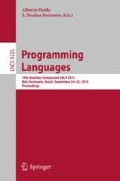Abstract
Deadlocks are a common type of concurrency bug. When a deadlock occurs, it is difficult to clearly determine whether there is an actual deadlock or if the application is slow or hanging due to a different reason. It is also difficult to establish the cause of the deadlock. In general, developers deal with deadlocks by using analysis tools, introducing application-specific deadlock detection mechanisms, or simply by using techniques to avoid the occurrence of deadlocks by construction. In this paper we propose a different approach. We believe that if deadlocks manifest at runtime, as exceptions, programmers will be able to identify these deadlocks in an accurate and timely manner. We leverage two insights to make this practical: (i) most deadlocks occurring in real systems involve only two threads acquiring two locks (TTTL deadlocks); and (ii) it’s possible to detect TTTL deadlocks efficiently enough for most practical systems. We conducted a study on bug reports and found that more than 90 % of identified deadlocks were indeed TTTL. We extended Java’s ReentrantLock class to detect TTTL deadlocks and measured the performance overhead of this approach with a conservative benchmark. For applications whose execution time is not dominated by locking, the overhead is estimated as below 6 %. Empirical usability evaluation in two experiments showed that students finished tasks 16.87 % to 30.7 % faster on the average using our approach with the lock being the most significant factor behind it, and, in one of the experiments answers were significantly more accurate (81.25 % more correct bugs found).
Access this chapter
Tax calculation will be finalised at checkout
Purchases are for personal use only
Notes
- 1.
Lucene: http://lucene.apache.org/.
- 2.
Eclipse: https://eclipse.org/.
- 3.
OpenJDK: http://openjdk.java.net/.
- 4.
Lucene bug reports list: http://goo.gl/DhVI3t.
- 5.
Eclipse bug reports: http://goo.gl/qQnrEm.
- 6.
OpenJDK bug reports: http://goo.gl/xYFfsO.
- 7.
Bug reports sample: http://goo.gl/zNsIGz.
References
Lu, S., et al.: Learning from mistakes: a comprehensive study on real world concurrency bug characteristics. In: ACM Sigplan Notices, vol. 43, no. 3. ACM (2008)
Singhal, M.: Deadlock detection in distributed systems. Computer 22(11), 37–48 (1989)
Knapp, E.: Deadlock detection in distributed databases. ACM Computing Surveys (CSUR) 19(4), 303–328 (1987)
Marino, D., et al.: Detecting deadlock in programs with data-centric synchronization. In: 2013 35th International Conference on Software Engineering (ICSE). IEEE (2013)
Marlow, S.: Parallel and Concurrent Programming in Haskell: Techniques for Multicore and Multithreaded Programming. O’Reilly, Aug 2013
Aimonetti, M.: Go Bootcamp: Chap. 8 - Concurrency. http://www.golangbootcamp.com/book/concurrency
Engler, D., Ashcraft, K.: RacerX: effective, static detection of race conditions and deadlocks. SIGOPS Oper. Syst. Rev. 37(5), 237–252 (2003)
Shanbhag, V.K.: Deadlock-detection in java-library using static-analysis. In: Asia-PacificSoftware Engineering Conference, pp. 361–368 (2008)
Williams, A., Thies, W., Awasthi, P.: Static deadlock detection for java libraries. In: Gao, X.-X. (ed.) ECOOP 2005. LNCS, vol. 3586, pp. 602–629. Springer, Heidelberg (2005)
Da Luo, Z., Das, R., Qi, Y.: Multicore sdk: a practical and efficient deadlock detector for real-world applications. In: 2011 IEEE Fourth International Conference on Software Testing, Verification and Validation (ICST). IEEE (2011)
Cai, Y., Chan, W.K.: MagicFuzzer: scalable deadlock detection for large-scale applications. In: Proceedings of the 2012 International Conference on Software Engineering. IEEE Press (2012)
Pyla, H.K., Varadarajan, S.: Avoiding deadlock avoidance. In: Proceedings of the 19th International Conference on Parallel Architectures and Compilation Techniques. ACM (2010)
Pyla, H.K., Varadarajan, S.: Transparent runtime deadlock elimination. In: Proceedings of the 21st International Conference on Parallel Architectures and Compilation Techniques, PACT 2012, pp. 477–478. ACM, New York (2012)
Pyla, H.K.: Safe Concurrent Programming and Execution (2013)
Biswas, S., et al.: Efficient, Software-Only Data Race Exceptions (2015)
Qin, F., Tucek, J., Zhou, Y., Sundaresan, J.: Rx: Treating bugs as allergies–a safe method to survive software failures. ACM Trans. Comput. Syst., 25(3), August 2007
Havelund, K., Pressburger, T.: Model checking java programs using java pathfinder. Int. J. Softw. Tools Technol. Transf. 2(4), 366–381 (2000)
Java’s ReentrantLock with DeadlockException. https://github.com/rafaelbrandao/java-lock-deadlock-exception
Eclipe’s OrderedLock class description. Documentation http://cct.lsu.edu/ rguidry/ecl31docs/api/org/eclipse/core/internal/jobs/OrderedLock.html
Sanchez, I: Latin Squares and its applications on software engineering. Master’s thesis, Federal University of Pernambuco, Recife, Brazil (2011)
Accioly, P.: Comparing different testing strategies for software product lines. Master’s thesis, Federal University of Pernambuco, Recife, Brazil (2012)
Runeson, P.: Using students as experiement subjects - an analysis on graduate and freshmen student data. In: Proceedings of the 7th International Conference on Empirical Assessment in Software Engineering. Keele University, UK, pp. 95–102 (2003)
Staron, M.: Using students as subjects in experiments - a quantitative analysis of the influence of experimentation on students’ learning process. In: CSEE & T, pp. 221–228. IEEE Computer Society (2007)
Box, G.E.P., Hunter, J.S., Hunter, W.G.: Statistics for Experimenters: Design, Innovation, and Discovery. Wiley-Interscience (2005)
Agresti, A.: A survey of exact inference for contingency tables. Statistical Science, pp. 131–153 (1992)
Lozi, J.-P., David, F., Thomas, G., Lawall, J., Muller, G.: Remote core locking: migrating critical-section execution to improve the performance of multithreaded applications. In: Proceedings of the 2012 USENIX Annual Technical Conference (USENIX ATC 2012), Berkeley, CA, USA (2012)
Acknowledgments
We thank feedback from anonymous reviewers and from SPG group at CIn/UFPE. Rafael was supported by a grant provided by CAPES. Fernando is supported by CNPq/Brazil (304755/2014-1, 487549/2012-0 and 477139/2013-2), FACEPE/Brazil (APQ- 0839-1.03/14) and INES (CNPq 573964/2008-4, FACEPE APQ-1037-1.03/08, and FACEPE APQ-0388-1.03/14).
Author information
Authors and Affiliations
Corresponding author
Editor information
Editors and Affiliations
Rights and permissions
Copyright information
© 2015 Springer International Publishing Switzerland
About this paper
Cite this paper
Lobo, R., Castor, F. (2015). Deadlocks as Runtime Exceptions. In: Pardo, A., Swierstra, S. (eds) Programming Languages. SBLP 2015. Lecture Notes in Computer Science(), vol 9325. Springer, Cham. https://doi.org/10.1007/978-3-319-24012-1_8
Download citation
DOI: https://doi.org/10.1007/978-3-319-24012-1_8
Published:
Publisher Name: Springer, Cham
Print ISBN: 978-3-319-24011-4
Online ISBN: 978-3-319-24012-1
eBook Packages: Computer ScienceComputer Science (R0)

